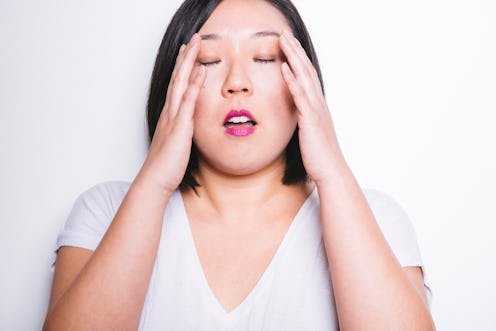
Hiccups can run the gamut from funny — especially when they happen at an inopportune times — to slightly annoying, uncomfortable, and even a bit painful. You might hiccup once and then move on with your day. Or you might be plagued by hiccups that last for hours. There are many possible causes for hiccups, and many things going on in the body when they occur.
"Hiccups are involuntary contractions of the diaphragm, which is [the] muscle below your lungs," Adrian Cotton, MD, chief of medical operations at Loma Linda University Health, tells Bustle. "When the muscle spasms, it tightens, and that constriction causes the vocal cords [to] close." Which results in the classic hiccup sound.
"Usually, hiccups last only a few minutes, but they can last for years," Dr. Cotton says. (Though this is rare.) "If hiccups last for more than 48 hours you should see your doctor," he says. "If hiccups persist, there are medications and surgeries [your doctor] can discuss with you."
There are also many tricks to make hiccups go away, that you can try at home. But the good news is, they usually stop all on their own. Read on for a few of the main causes of hiccups, as well as what's actually going on in your body when you have them, according to experts.
1
Your Diaphragm Is Irritated
Hiccups occur when there's irritation of the diaphragm, which is the muscle you use to breathe. "This results in spasms of that muscle, which causes a sudden sucking in of air," Dr. Richard Honaker, MD, tells Bustle. "That causes a click of the vocal cords as they close quickly."
2
Your Vocal Cords Are Closing
When your vocal cords close quickly due to this spasm, it "makes the ‘hic’ sound," Dr. Cotton says. "The ‘tightening’ sensation people feel in their throats during a hiccup is their vocal cords closing." Many people say they feel pressure right before the hiccup, and this is why.
3
You're Swallowing Air
If you're in a rush to finish lunch, and end up eating too quickly, don't be surprised if you get hiccups afterward.
"Eating too fast results in air swallowing which distends the stomach," Dr. Honaker says. "The diaphragm is a domed-shaped muscle that separates the abdominal organs from the chest organs. Thus, the stomach lies right under the left diaphragm. When it is distended it pushes on the diaphragm, causing muscle spasm due to the irritation."
4
Your Emotions Are Running High
If you feel like you get hiccups whenever you're surprised or upset, you're definitely not alone. "It’s not always about the way we drink or eat — hiccuping can also be triggered by [...] emotional situations," Caleb Backe, a health and wellness expert at Maple Holistics, tells Bustle.
This is why having someone scare you is a common "cure" for hiccups. It's all about the change in emotion, Backe says, so "getting a shock can sometimes get rid of them."
5
You're Anxious
"Anxiety also results in air swallowing in some people as they may have subtle, mild hyperventilation," Dr. Honaker says. When you're breathing rapidly, or having a panic attack and taking in a lot of hair, you may get hiccups as a result.
"We all know how anxiety can make neck muscles tight [and] the same things happens in abdominal muscles," he says. "When that happens it puts pressure on the abdominal organs and they are pushed up inside the abdomen, putting pressure on and irritating the diaphragm."
6
Your Nerves Aren't Communicating Properly
"Hiccups are the most common abnormality of the diaphragm," chiropractor Keith Sparks, DC, tells Bustle. "The diaphragm is innervated by the nerves of the lower neck. Hiccups occur when the diaphragm and these nerves are no longer communicating correctly. As a result, we feel a temporary spasm in the diaphragm which we call a hiccup."
It's not a permanent situation, however. As Sparks says, "Most of the time, the brain-body connection will figure out this solution subconsciously before a conscious solution is found." You can try a trick or two to get rid of hiccups, but time tends to be the best remedy.
7
You Might Have Another Health Issue
In rare cases, hiccups that last long-term may be a sign of an underlying health issue, like diabetes. "Diabetes can lead to periods of stomach paralysis, which can cause a variety of uncomfortable symptoms, including abnormal abdominal bloating," Samantha Morrison, a health and wellness expert for Glacier Wellness, tells Bustle. "In turn, your bloated stomach can put pressure on your diaphragm for extended periods of time and lead to persistent hiccups."
Hiccups happen to pretty much everyone, at one point or another. They may be the result of eating too quickly, or swallowing too much air, and as a result usually sort themselves out on their own. Unless you have them for more than 48 hours, hiccups — and the way they affect the body — are nothing more than an inconvenience.